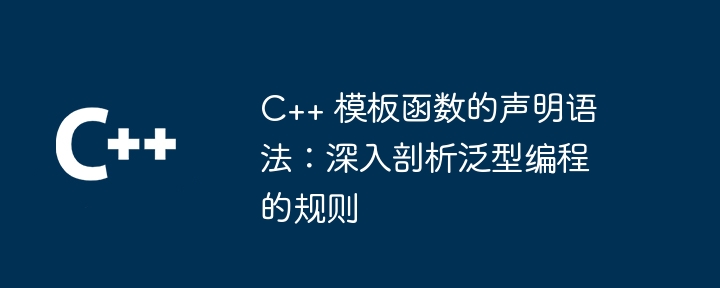Home >Backend Development >C++ >Declaration syntax for C++ template functions: an in-depth analysis of the rules of generic programming
Declaration syntax for C++ template functions: an in-depth analysis of the rules of generic programming
- WBOYWBOYWBOYWBOYWBOYWBOYWBOYWBOYWBOYWBOYWBOYWBOYWBOriginal
- 2024-05-04 16:36:01447browse
Declaration syntax of template function: template 75a837cf562f69348eb0e119bf9e56d8returnType functionName(parameters), which represents the data type T operated by the function, as well as the return type, name and parameters of the function.

C Declaration syntax for template functions: Rules of generic programming**
Overview
Template functions is a powerful feature in C that allows the creation of general-purpose functions that can be customized as data types change. Understanding the declaration syntax of template functions is critical to effectively utilizing this feature.
Declaration syntax
The declaration syntax of the template function is as follows:
template <typename T>
returnType functionName(parameters) {
// 函数体
}Where:
- ##9f50db5a01136ea81a1b30d0eb797ed9
: declares the template parameterT, which represents the data type that the function will operate on. - returnType
: The return type of the function. - functionName
: The name of the function. - parameters
: Function parameter list, including type and name.
Generic type
typename keyword indicates that T is a type rather than a variable. This allows functions to use types as parameters, not just data values.
Practical case: exchange function
Let us take the functionswap() that exchanges two values as an example:
template <typename T>
void swap(T& a, T& b) {
T temp = a;
a = b;
b = temp;
}This function uses the template type T and can exchange two values of any type. We can use this function as follows:
int x = 5, y = 10; swap(x, y); // 交换整数值 cout << x << " " << y << endl; // 输出结果:10 5 double a = 3.14, b = 2.71; swap(a, b); // 交换双精度数值 cout << a << " " << b << endl; // 输出结果:2.71 3.14
Conclusion
Understanding the declaration syntax of template functions is crucial to writing reusable and efficient code. By using generic types, we can create general-purpose functions that can operate on any type of data.The above is the detailed content of Declaration syntax for C++ template functions: an in-depth analysis of the rules of generic programming. For more information, please follow other related articles on the PHP Chinese website!
Related articles
See more- How to create a new c language file in vc++6.0
- What are the differences between = and == in C++?
- How to implement generic programming using C++ function templates?
- What are the advantages and limitations of C++ generic programming?
- C++ function exceptions and generic programming: using exceptions to improve code reusability

